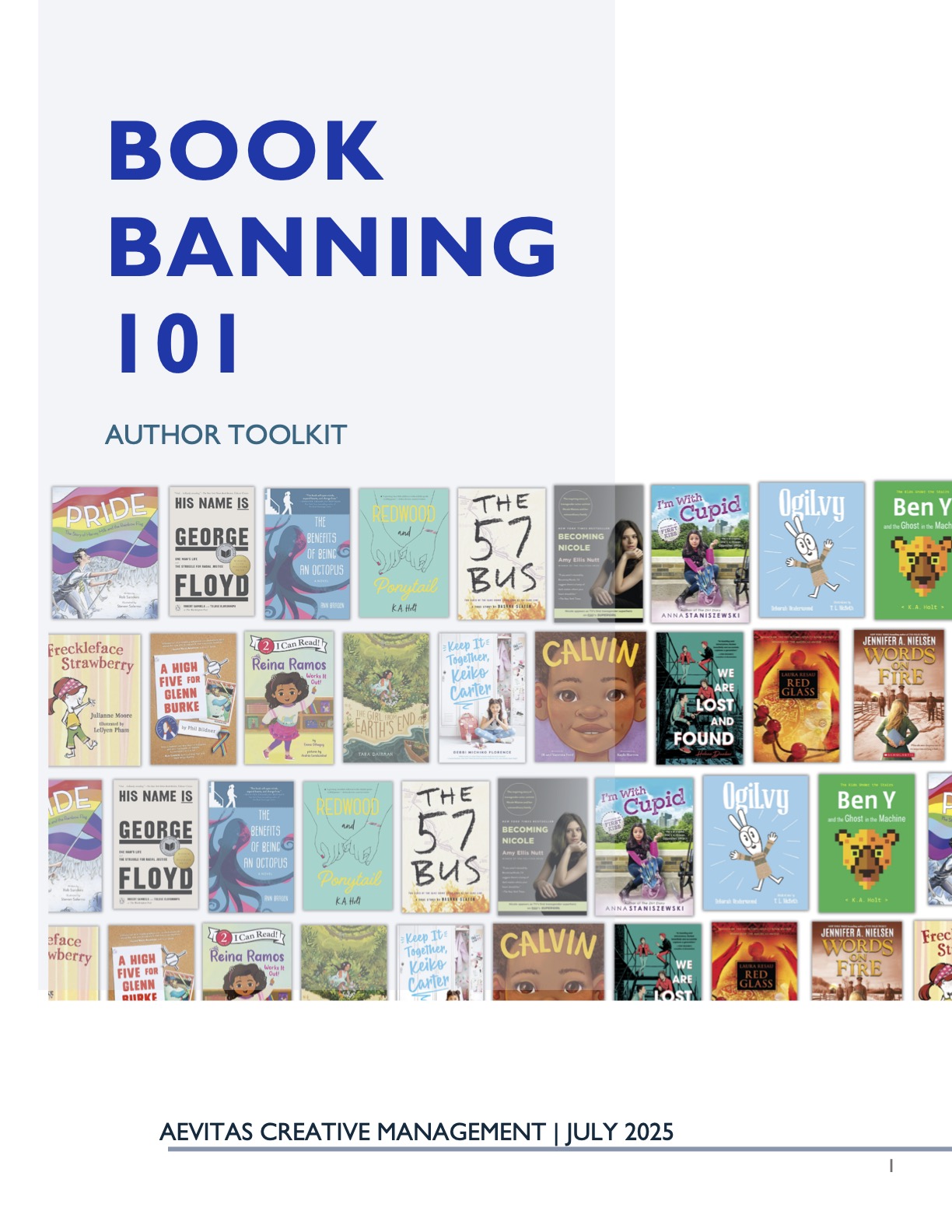Impact
Book banning is a problem across America and grows every day. We at Aevitas collaborated with many wonderful organizations already doing work in this space to put together the below toolkit for authors whose books have been banned. We know it can be an isolating and upsetting experience to be told that your work is not suitable for schools or libraries, and we hope that this helps authors fight the bans. We encourage everyone in the publishing and literary community to share this toolkit widely.
Download Toolkit PDFPreview ToolkitSee More ResourcesOther Resources
Publishing Professionals Against Book Bans
Publishing Professionals Against Book Bans is a coalition of book publishers, editors, publicists, marketers, agents, and other industry professionals who stand united against the deeply unconstitutional movement to limit the freedom to read.
Visit WebsitePEN America on Book Bans
PEN America tracks book bans and fights censorship in public schools and libraries across the country. They found that 6,870 books bans were enacted during the 2024-25 school year, across 23 states and 87 public school districts, and they documented nearly 16,000 book bans in public schools nationwide since 2021, a number not seen since the Red Scare McCarthy era of the 1950s.
Visit WebsiteBanned Books Week: Oct. 5–11, 2025
Banned Books Week was launched in 1982 in response to a sudden surge in the number of challenges to books in libraries, bookstores, and schools. The annual event highlights the value of free and open access to information and brings together the entire book community—librarians, educators, authors, publishers, booksellers, and readers of all types—in shared support of the freedom to seek and to express ideas.
Visit WebsiteNational Coalition Against Censorship
The National Coalition Against Censorship was formed by a group of activists affiliated with the ACLU in response to the 1973 Supreme Court decision in Miller v. California, which narrowed First Amendment protections for sexual expression and opened the door to obscenity prosecutions. As an alliance of more than 50 national non-profits, including literary, artistic, religious, educational, professional, labor, and civil liberties groups, they have engaged in direct advocacy and education to support First Amendment principles for over 40 years.
Visit WebsiteThe Librarians, a documentary film by Kim Snyder
Librarians emerge as first responders in the fight for democracy and our First Amendment Rights. As they well know, controlling the flow of ideas means control over communities. In Texas, the Krause List targets 850 books focused on race and LGBTQia+ stories–triggering sweeping book bans across the U.S. at an unprecedented rate. As tensions escalate, librarians connect the dots from heated school and library board meetings nationwide to lay bare the underpinnings of extremism fueling the censorship efforts. Despite facing harassment, threats, and laws aimed at criminalizing their work–the librarians’ rallying cry for freedom to read is a chilling cautionary tale.
Visit WebsiteAuthors Against Book Bans
Authors Against Book Bans is a coalition of writers, illustrators, anthology editors and contributors, and other book creators, stand united against the deeply unconstitutional movement to limit the freedom to read. They aim to provide a framework for local organizing, coordination and “ban alert” information on a national level, strategic calls to action at local and national levels, partnerships with a variety of national organizations and grass-roots groups that support the freedom to read, and support and encouragement for the educators, librarians, parents, and students who are the first line of defense against censorship, and for the authors whose books are under attack.
Visit WebsiteAmerican Booksellers Association's Right to Read Toolkit
American Booksellers Association is a national trade association that supports and advocates for the success of independent bookstores. They provide members and over 3,200 independent bookstores with education, networking opportunities, advocacy, resources, and technology.
Visit WebsiteThe Authors Guild
The Authors Guild advocates for the rights of professional writers to create, publish, and earn a sustainable living as fiction and nonfiction writers, poets, translators, and journalists.
Visit WebsiteAmerican Library Association
The American Library Association's Office for Intellectual Freedom (OIF) encourages library workers and educators to amplify the "Report Censorship" message. Article III of the Library Bill of Rights states, “Libraries should challenge censorship in the fulfillment of their responsibility to provide information and enlightenment.” Challenges, bans, or access issues can be reported using the form on their site, which contains other tools and resources like their blog post, "Should I Report Censorship?"
Penguin Random House Banned Books Resource
Penguin Random House (which comprises over 300 publishing imprints) has released How You Can Fight Censorship: Resources for Authors and Creators, with an introduction from Jacob Tobia, author of Sissy, and resources for authors in the fight against book bans.
Visit WebsiteBook Banning 101 Author Toolkit

New York, NY 10010






